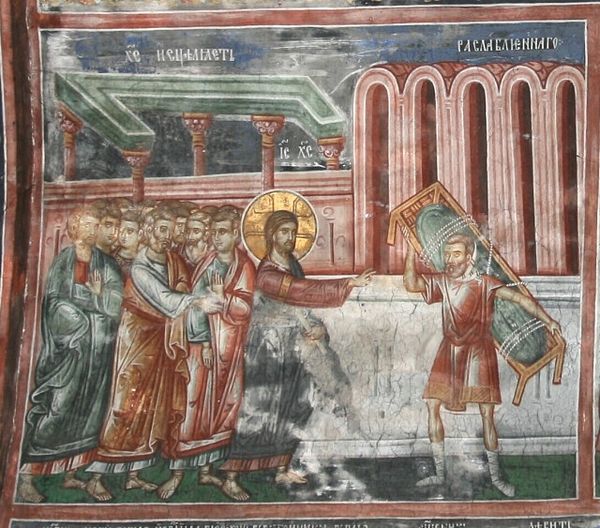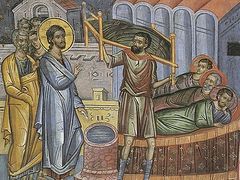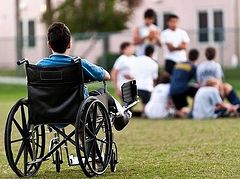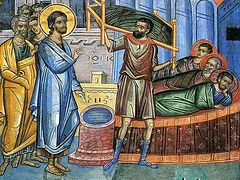 Photo: russianicons.wordpress.com
Photo: russianicons.wordpress.com
After this there was a feast of the Jews, and Jesus went up to Jerusalem. Now there is in Jerusalem by the Sheep Gate a pool, which is called in Hebrew, Bethesda, having five porches. In these lay a great multitude of sick people, blind, lame, paralyzed, waiting for the moving of the water. For an angel went down at a certain time into the pool and stirred up the water; then whoever stepped in first, after the stirring of the water, was made well of whatever disease he had.
Now a certain man was there who had an infirmity thirty-eight years. When Jesus saw him lying there, and knew that he already had been in that condition a long time, He said to him, “Do you want to be made well?” The sick man answered Him, “Sir, I have no man to put me into the pool when the water is stirred up; but while I am coming, another steps down before me.” Jesus said to him, “Rise, take up your bed and walk.” And immediately the man was made well, took up his bed, and walked. And that day was the Sabbath. The Jews therefore said to him who was cured, “It is the Sabbath; it is not lawful for you to carry your bed.” He answered them, “He who made me well said to me, ‘Take up your bed and walk.’” Then they asked him, “Who is the Man who said to you, ‘Take up your bed and walk’?” But the one who was healed did not know who it was, for Jesus had withdrawn, a multitude being in that place. Afterward Jesus found him in the temple, and said to him, “See, you have been made well. Sin no more, lest a worse thing come upon you.” The man departed and told the Jews that it was Jesus who had made him well. (John 5:1-15)
Jesus said: And he said to all, “If any one would come after me, let him deny himself and take up his cross daily and follow me. (Luke 9:23)
The Paralytic in John 5 is commanded to rise, take up his bed and walk. It turns out that his cross, the cross on which he had been crucified, is his own bed to which he had been nailed for 38 years of paralysis. He picks up that cross so that he can walk with Christ and follow Christ wherever Christ may go.
Today’s Gospel lesson shows us how “taking up the cross” might be a very different experience than we usually imagine it to be – and it is possible that taking up the Cross is a blessing rather than a burden. For most of us, there are enough trials and temptations each day of our life to make life difficult, and some would feel almost impossible to accomplish. Why then would we want to take up the Cross to add to our burdens, sorrows and troubles?
What we learn from today’s Gospel lesson is that there are two kinds of burdens – the ones we should lay down and not carry because we follow God’s blessed Sabbath rest, and the burden we must carry In order to follow Christ – the cross that it is necessary for us to carry to follow Him. The issue is whether we can see what is the cross in my life that I have to take up in order to follow Christ. There are some burdens we must bear as Christians to be faithful to our Lord.
It is also true that in taking up the Cross we can find ourselves liberated from our own heavy burdens – our thoughts and ideas of justice, revenge, repentance, forgiveness, hatred and retribution. These are the burdens we can lay down in order to hear and obey Christ.
Additionally, If we allow it to, the Cross can carry us through some of life’s trials. Yet, this thought makes us squirm with discomfort for we are terrified at the thought of being lifted up on the Cross and we prefer an easier way in which there is no pain and no cost to us.
Today’s Gospel reaffirms the truth that God’s commandments are not heavy and difficult burdens. God liberates us from our wearisome burdens.
Today’s Gospel lesson takes place at the sheep pool called Bethesda – a pool of water near one of the gates allowing passage into Jerusalem. The sheep gate is first mentioned in the Book of Nehemiah, written about 450 years before the time of Christ. Nehemiah records the building of the sheep gate. He is one of the prophets who advocated that Israel must keep the Sabbath Day holy:
When it began to be dark at the gates of Jerusalem before the sabbath, I commanded that the doors should be shut and gave orders that they should not be opened until after the sabbath. And I set some of my servants over the gates, that no burden might be brought in on the sabbath day.(Nehemiah 13:19)
Nehemiah’s prohibition against carrying a burden on the Sabbath day near one of the city gates is the basis of our the Gospel lesson in John 5. The people in the Gospel account were practicing what Nehemiah commanded the to do when they confront the paralytic for carrying his bed on the Sabbath near the city gate. They probably thought he was a bed salesman carrying his wares! The Prophet Jeremiah adds:
Thus said the LORD to me: “Go and stand in the Benjamin Gate, by which the kings of Judah enter and by which they go out, and in all the gates of Jerusalem, and say: ‘Hear the word of the LORD, you kings of Judah, and all Judah, and all the inhabitants of Jerusalem, who enter by these gates. Thus says the LORD: Take heed for the sake of your lives, and do not bear a burden on the sabbath day or bring it in by the gates of Jerusalem. And do not carry a burden out of your houses on the sabbath or do any work, but keep the sabbath day holy, as I commanded your fathers. Yet they did not listen or incline their ear, but stiffened their neck, that they might not hear and receive instruction. ‘But if you listen to me, says the LORD, and bring in no burden by the gates of this city on the sabbath day, but keep the sabbath day holy and do no work on it, then there shall enter by the gates of this city kings who sit on the throne of David, riding in chariots and on horses, they and their princes, the men of Judah and the inhabitants of Jerusalem; and this city shall be inhabited for ever. (Jeremiah 17:19-25)
No wonder the people were so upset with this paralytic carrying his bed on the sabbath!
So why would Jesus, the Son of God, tell this paralyzed man to carry his bed on the Sabbath at the very place where God had said through His prophets that it shouldn’t be done?
The answer becomes clear when Jesus asks the paralytic, “Do you want to be made well? Do you want to become healthy?”
For Jesus the paralyzed man’s burden is not his bed, but his paralysis. His burden is also that though he is part of the people of God, he has no one to help him. His sickness is the burden of His life. And on that Sabbath Day, Jesus gave the paralyzed man rest from his burden for Jesus freed him of his paralysis. [see my post The True Sabbath Rest] When the paralyzed man picked up his bed, he was also finally laying down his burden, his paralysis and was given health. For his paralysis had also burdened the man with bitterness and doubt, opening his heart to the oppression of Satan.
Therefore, while the promise of entering his rest remains, let us fear lest any of you be judged to have failed to reach it. For good news came to us just as to them; but the message which they heard did not benefit them, because it did not meet with faith in the hearers. For we who have believed enter that rest . . . For he has somewhere spoken of the seventh day in this way, “And God rested on the seventh day from all his works.” . . . So then, there remains a sabbath rest for the people of God; for whoever enters God’s rest also ceases from his labors as God did from his. Let us therefore strive to enter that rest, that no one fall by the same sort of disobedience. (Hebrews 4:1-11)
Yet some of those people in Jerusalem could not see how Jesus freeing the man from carrying his burden, his paralysis, was keeping God’s law. That is why Jesus said to them:
“I ask you, is it lawful on the sabbath to do good or to do harm, to save life or to destroy it?” (Luke 6:9)
And Jesus spoke to the lawyers and Pharisees, saying, “Is it lawful to heal on the sabbath, or not?” But they were silent. Then he took him and healed him, and let him go. And he said to them, “Which of you, having a son or an ox that has fallen into a well, will not immediately pull him out on a sabbath day?” (Luke 14:3-5)
Carrying a bed on the Sabbath as is shown in the Gospel might not be a violation of the Sabbath but rather might be a sign that one is entering into the Lord’s rest. The burden which concerns God might surprise us, as Jeremiah says:
“When one of this people, or a prophet, or a priest asks you, ‘What is the burden of the LORD?’ you shall say to them, ‘You are the burden, and I will cast you off, says the LORD.’ (Jeremiah 23:33)
The people’s mistaken understanding of the Torah made them into a burden, which this paralyzed man also had to bear in addition to the burden of his paralysis. But the paralytic shows himself to be following God’s command because he listens to the words of Christ and obeys them:
Truly, truly, I say to you, he who hears my word and believes him who sent me, has eternal life; he does not come into judgment, but has passed from death to life. (John 5:24)
We have to discern what are the burden we carry from which God will free us? Our sins, our debts, our guilt, our desire for revenge.
Sometimes, however, we act as if our burdens are prayer, fasting, confession, Sunday worship, reading scripture, forgiving others, apologizing for our sins, giving to charity, seeking forgiveness, being generous.
We ask: Do I have to come to church on Sunday? Jesus asks, do you want to be made well?
We ask: Do I need to tithe to the church? Jesus asks, do you want to be made well?
We ask: do I have to go to confession? Jesus asks, do you want to be made well?
We ask: do I have to forgive those who sin against me? Jesus asks, do you want to be made well?
We ask: do I have to fast and pray and practice self-control? Jesus asks, do you want to be made well?
We ask: Do I really have to stop looking at pornography or stop getting drunk or stop my bouts of anger and rage? Jesus asks, do you want to be made well?
We ask: Do I have to stop hating people who are worthless and do I need to show mercy and be kind to those I don’t know and don’t like? Jesus asks, do you want to be made well?
Jesus says to us:
Come to me, all who labor and are heavy laden, and I will give you rest. Take my yoke upon you, and learn from me; for I am gentle and lowly in heart, and you will find rest for your souls. For my yoke is easy, and my burden is light.” (Matthew 11:28-30)
Sometimes we wrongly believe that the way out of our problems, our passions, our sins, is more effort on our part. If only we have more faith or fast more or pray more, then God would help us. But the paralyzed man couldn’t save himself, no matter how hard he tried, his problems were insurmountable to him. He couldn’t get into the pool of water first no matter how much he wanted to. This man had plenty of faith, after all he had been waiting at the pool for 38 years for someone to help him get into the water and be healed. He believed God was present there and continued in this hope for 38 years! Nonetheless, his salvation lay outside himself. It wasn’t more effort on this part that were needed – he needed Christ, he needed to wait on the Lord, he needed Jesus to be his spiritual partner.
It is possible, my brothers and sister, that there are people all around us, like this man paralyzed for 38 years and patiently waiting for help – people for whom we can be Christ and reach out to them and help them. And it is possible that we have been struggling with some burden for many years feeling there is no one to help me, and the solution might be outside of myself – in seeking help from a neighbor or a stranger. The lessons for us in this Gospel periscope are many, we need to know when we are to be Christ to another and when we need someone else to be Christ for us. As St Paul said: Bear one another’s burdens, and so fulfill the law of Christ. (Galatians 6:2)



